Social Factors, Healthcare, and Dementia: A Proactive Care Report
VerifiedAdded on 2023/03/31
|8
|1747
|153
Report
AI Summary
This report delves into the critical role society plays in healthcare, with a specific emphasis on the proactive care of vulnerable adults, particularly those suffering from dementia. The paper explores the significance of social motivational factors in influencing health and ill health, highlighting how community support can improve the well-being and life expectancy of dementia patients. It also examines the function of social support networks, including family, friends, and community groups, in providing emotional, material, and informational assistance to those in need. Furthermore, the report analyzes the detrimental effects of lacking support networks on health, emphasizing the increased stress and loneliness that can arise. The report concludes with recommendations for enhancing societal support for all individuals, especially those with health issues, to improve their quality of life and prevent premature deaths. The importance of support networks is highlighted for the well-being of the community.
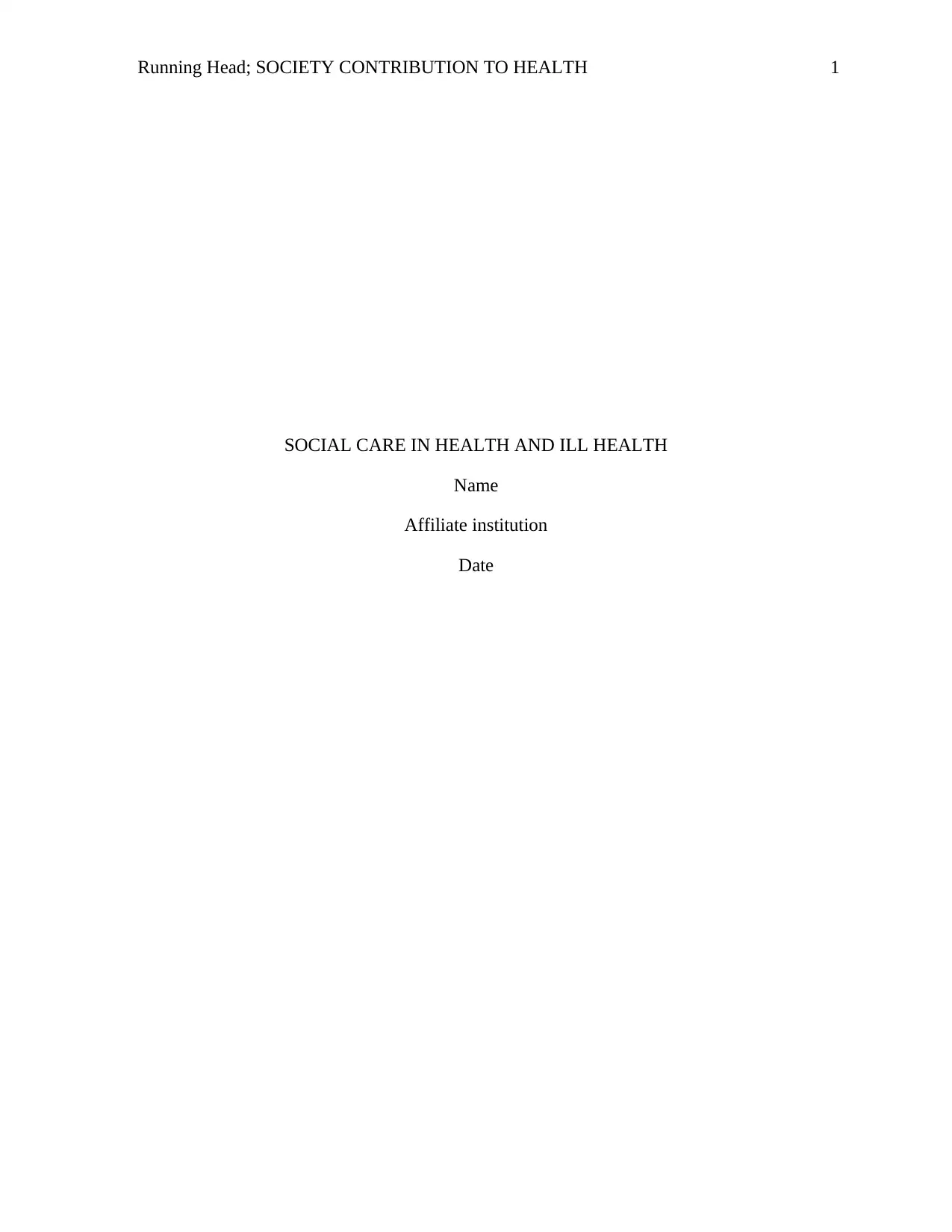
Running Head; SOCIETY CONTRIBUTION TO HEALTH 1
SOCIAL CARE IN HEALTH AND ILL HEALTH
Name
Affiliate institution
Date
SOCIAL CARE IN HEALTH AND ILL HEALTH
Name
Affiliate institution
Date
Paraphrase This Document
Need a fresh take? Get an instant paraphrase of this document with our AI Paraphraser
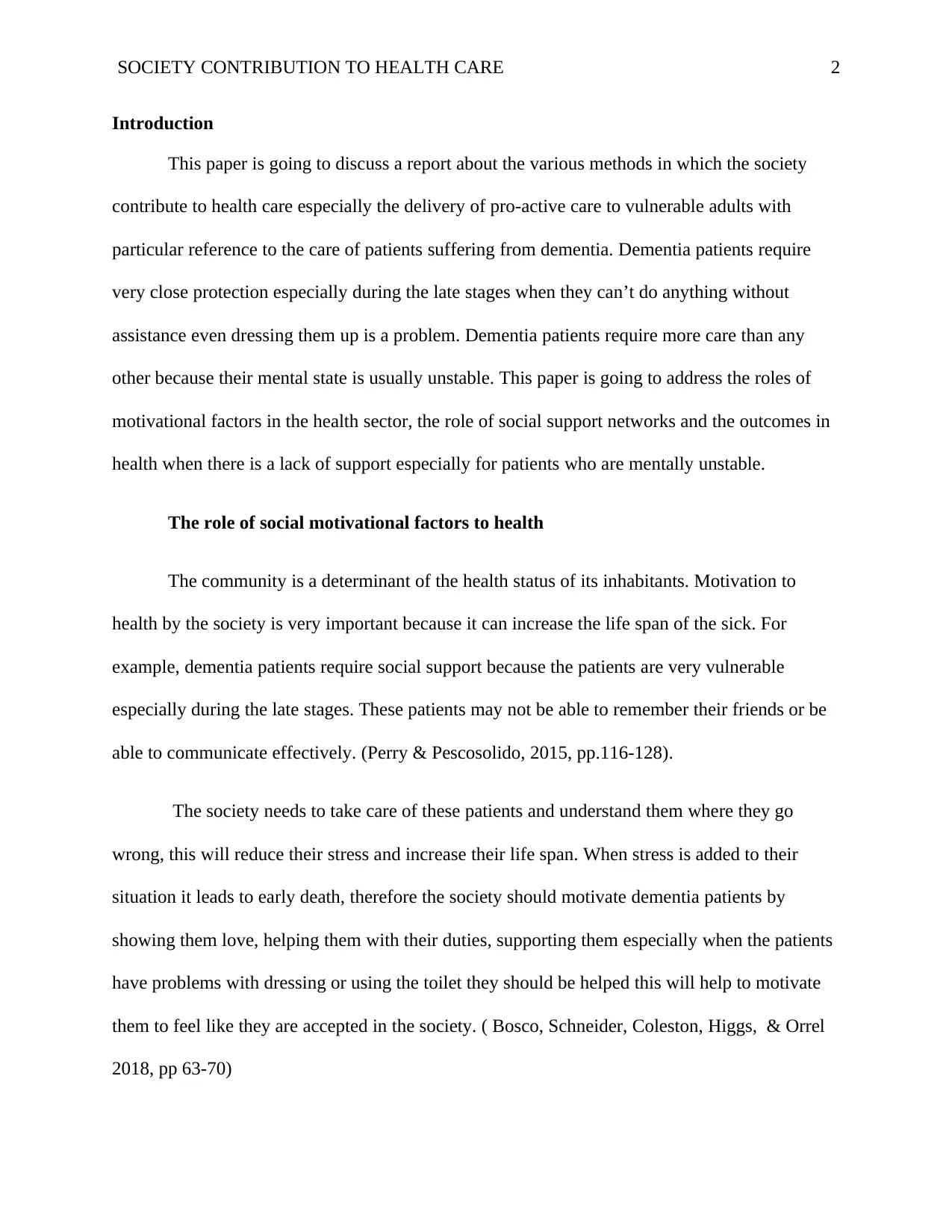
SOCIETY CONTRIBUTION TO HEALTH CARE 2
Introduction
This paper is going to discuss a report about the various methods in which the society
contribute to health care especially the delivery of pro-active care to vulnerable adults with
particular reference to the care of patients suffering from dementia. Dementia patients require
very close protection especially during the late stages when they can’t do anything without
assistance even dressing them up is a problem. Dementia patients require more care than any
other because their mental state is usually unstable. This paper is going to address the roles of
motivational factors in the health sector, the role of social support networks and the outcomes in
health when there is a lack of support especially for patients who are mentally unstable.
The role of social motivational factors to health
The community is a determinant of the health status of its inhabitants. Motivation to
health by the society is very important because it can increase the life span of the sick. For
example, dementia patients require social support because the patients are very vulnerable
especially during the late stages. These patients may not be able to remember their friends or be
able to communicate effectively. (Perry & Pescosolido, 2015, pp.116-128).
The society needs to take care of these patients and understand them where they go
wrong, this will reduce their stress and increase their life span. When stress is added to their
situation it leads to early death, therefore the society should motivate dementia patients by
showing them love, helping them with their duties, supporting them especially when the patients
have problems with dressing or using the toilet they should be helped this will help to motivate
them to feel like they are accepted in the society. ( Bosco, Schneider, Coleston, Higgs, & Orrel
2018, pp 63-70)
Introduction
This paper is going to discuss a report about the various methods in which the society
contribute to health care especially the delivery of pro-active care to vulnerable adults with
particular reference to the care of patients suffering from dementia. Dementia patients require
very close protection especially during the late stages when they can’t do anything without
assistance even dressing them up is a problem. Dementia patients require more care than any
other because their mental state is usually unstable. This paper is going to address the roles of
motivational factors in the health sector, the role of social support networks and the outcomes in
health when there is a lack of support especially for patients who are mentally unstable.
The role of social motivational factors to health
The community is a determinant of the health status of its inhabitants. Motivation to
health by the society is very important because it can increase the life span of the sick. For
example, dementia patients require social support because the patients are very vulnerable
especially during the late stages. These patients may not be able to remember their friends or be
able to communicate effectively. (Perry & Pescosolido, 2015, pp.116-128).
The society needs to take care of these patients and understand them where they go
wrong, this will reduce their stress and increase their life span. When stress is added to their
situation it leads to early death, therefore the society should motivate dementia patients by
showing them love, helping them with their duties, supporting them especially when the patients
have problems with dressing or using the toilet they should be helped this will help to motivate
them to feel like they are accepted in the society. ( Bosco, Schneider, Coleston, Higgs, & Orrel
2018, pp 63-70)
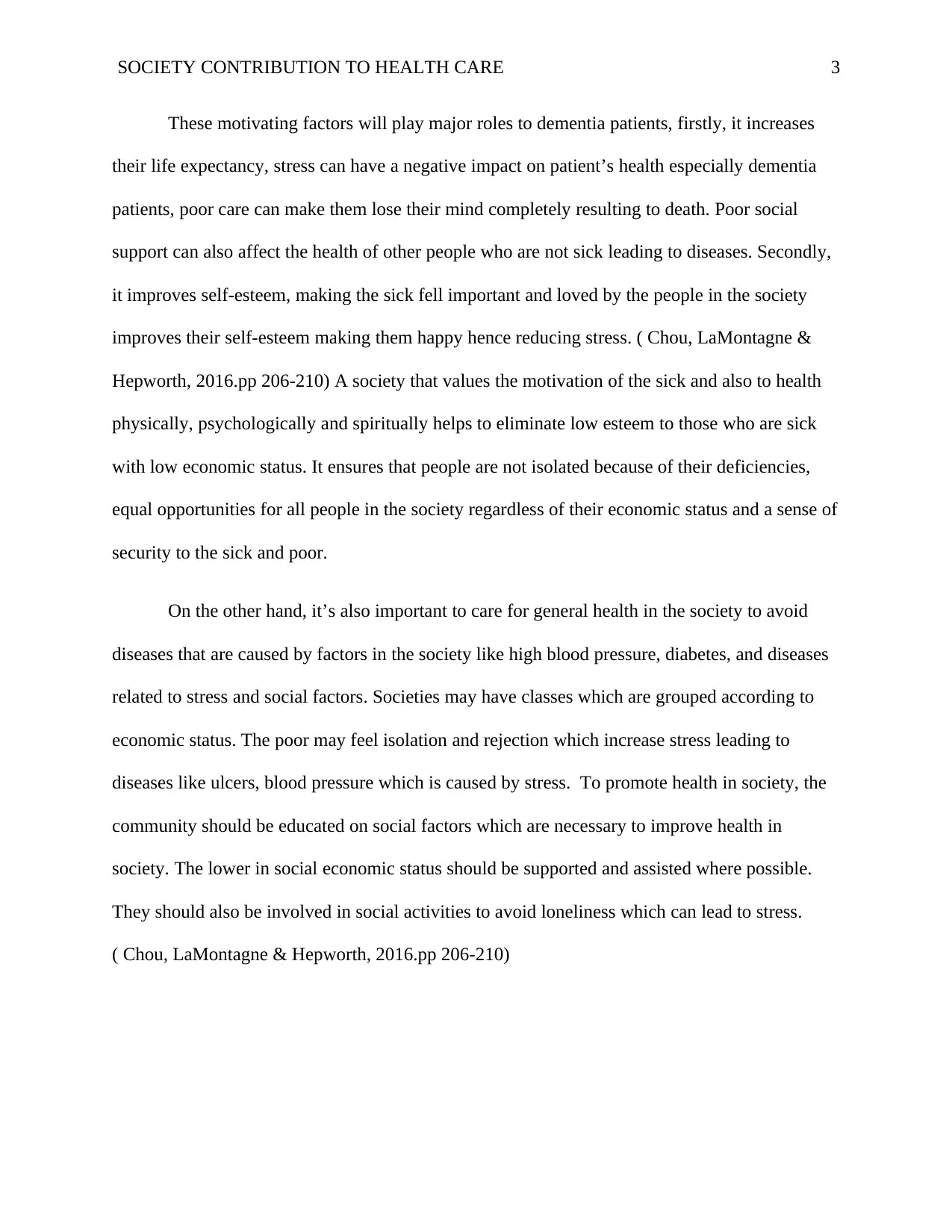
SOCIETY CONTRIBUTION TO HEALTH CARE 3
These motivating factors will play major roles to dementia patients, firstly, it increases
their life expectancy, stress can have a negative impact on patient’s health especially dementia
patients, poor care can make them lose their mind completely resulting to death. Poor social
support can also affect the health of other people who are not sick leading to diseases. Secondly,
it improves self-esteem, making the sick fell important and loved by the people in the society
improves their self-esteem making them happy hence reducing stress. ( Chou, LaMontagne &
Hepworth, 2016.pp 206-210) A society that values the motivation of the sick and also to health
physically, psychologically and spiritually helps to eliminate low esteem to those who are sick
with low economic status. It ensures that people are not isolated because of their deficiencies,
equal opportunities for all people in the society regardless of their economic status and a sense of
security to the sick and poor.
On the other hand, it’s also important to care for general health in the society to avoid
diseases that are caused by factors in the society like high blood pressure, diabetes, and diseases
related to stress and social factors. Societies may have classes which are grouped according to
economic status. The poor may feel isolation and rejection which increase stress leading to
diseases like ulcers, blood pressure which is caused by stress. To promote health in society, the
community should be educated on social factors which are necessary to improve health in
society. The lower in social economic status should be supported and assisted where possible.
They should also be involved in social activities to avoid loneliness which can lead to stress.
( Chou, LaMontagne & Hepworth, 2016.pp 206-210)
These motivating factors will play major roles to dementia patients, firstly, it increases
their life expectancy, stress can have a negative impact on patient’s health especially dementia
patients, poor care can make them lose their mind completely resulting to death. Poor social
support can also affect the health of other people who are not sick leading to diseases. Secondly,
it improves self-esteem, making the sick fell important and loved by the people in the society
improves their self-esteem making them happy hence reducing stress. ( Chou, LaMontagne &
Hepworth, 2016.pp 206-210) A society that values the motivation of the sick and also to health
physically, psychologically and spiritually helps to eliminate low esteem to those who are sick
with low economic status. It ensures that people are not isolated because of their deficiencies,
equal opportunities for all people in the society regardless of their economic status and a sense of
security to the sick and poor.
On the other hand, it’s also important to care for general health in the society to avoid
diseases that are caused by factors in the society like high blood pressure, diabetes, and diseases
related to stress and social factors. Societies may have classes which are grouped according to
economic status. The poor may feel isolation and rejection which increase stress leading to
diseases like ulcers, blood pressure which is caused by stress. To promote health in society, the
community should be educated on social factors which are necessary to improve health in
society. The lower in social economic status should be supported and assisted where possible.
They should also be involved in social activities to avoid loneliness which can lead to stress.
( Chou, LaMontagne & Hepworth, 2016.pp 206-210)
⊘ This is a preview!⊘
Do you want full access?
Subscribe today to unlock all pages.

Trusted by 1+ million students worldwide
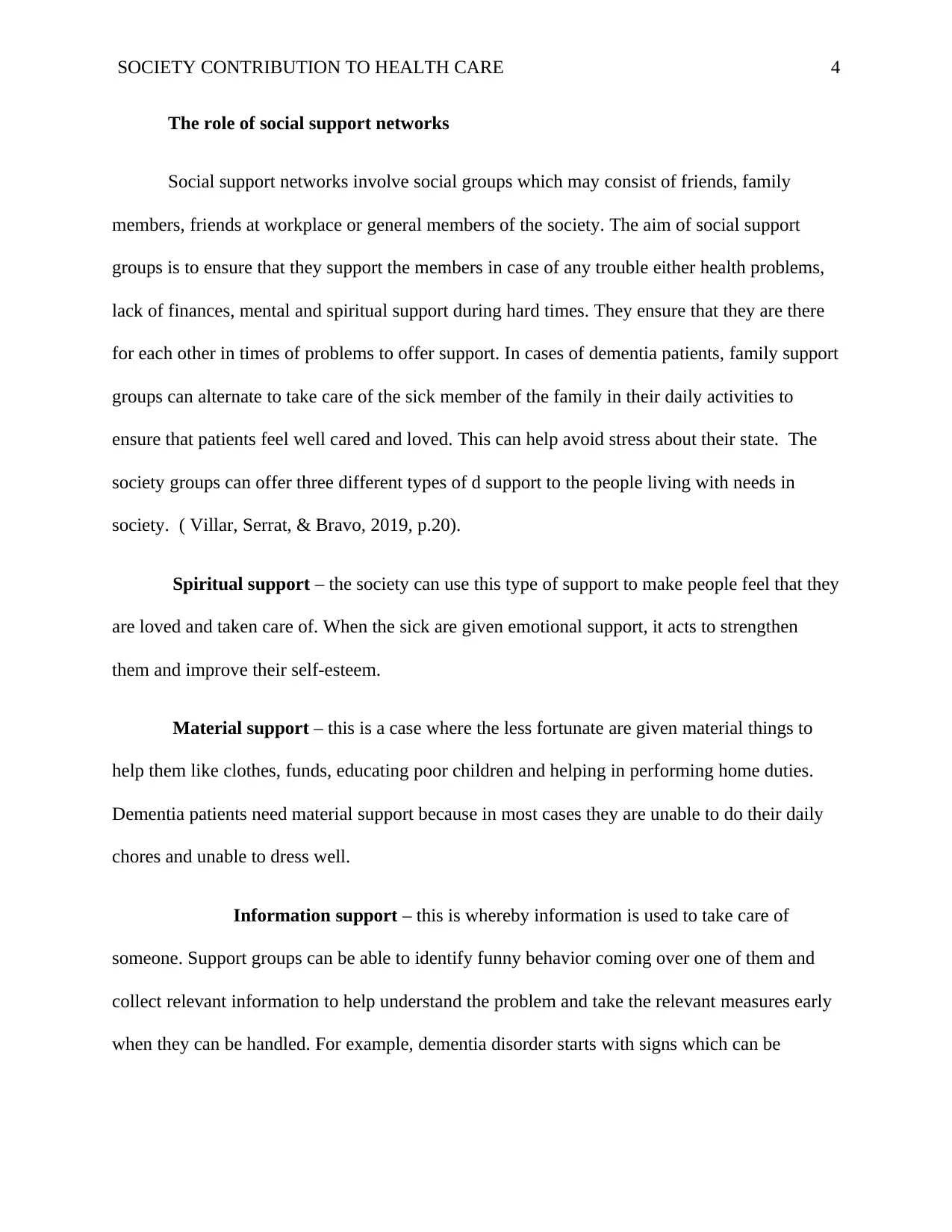
SOCIETY CONTRIBUTION TO HEALTH CARE 4
The role of social support networks
Social support networks involve social groups which may consist of friends, family
members, friends at workplace or general members of the society. The aim of social support
groups is to ensure that they support the members in case of any trouble either health problems,
lack of finances, mental and spiritual support during hard times. They ensure that they are there
for each other in times of problems to offer support. In cases of dementia patients, family support
groups can alternate to take care of the sick member of the family in their daily activities to
ensure that patients feel well cared and loved. This can help avoid stress about their state. The
society groups can offer three different types of d support to the people living with needs in
society. ( Villar, Serrat, & Bravo, 2019, p.20).
Spiritual support – the society can use this type of support to make people feel that they
are loved and taken care of. When the sick are given emotional support, it acts to strengthen
them and improve their self-esteem.
Material support – this is a case where the less fortunate are given material things to
help them like clothes, funds, educating poor children and helping in performing home duties.
Dementia patients need material support because in most cases they are unable to do their daily
chores and unable to dress well.
Information support – this is whereby information is used to take care of
someone. Support groups can be able to identify funny behavior coming over one of them and
collect relevant information to help understand the problem and take the relevant measures early
when they can be handled. For example, dementia disorder starts with signs which can be
The role of social support networks
Social support networks involve social groups which may consist of friends, family
members, friends at workplace or general members of the society. The aim of social support
groups is to ensure that they support the members in case of any trouble either health problems,
lack of finances, mental and spiritual support during hard times. They ensure that they are there
for each other in times of problems to offer support. In cases of dementia patients, family support
groups can alternate to take care of the sick member of the family in their daily activities to
ensure that patients feel well cared and loved. This can help avoid stress about their state. The
society groups can offer three different types of d support to the people living with needs in
society. ( Villar, Serrat, & Bravo, 2019, p.20).
Spiritual support – the society can use this type of support to make people feel that they
are loved and taken care of. When the sick are given emotional support, it acts to strengthen
them and improve their self-esteem.
Material support – this is a case where the less fortunate are given material things to
help them like clothes, funds, educating poor children and helping in performing home duties.
Dementia patients need material support because in most cases they are unable to do their daily
chores and unable to dress well.
Information support – this is whereby information is used to take care of
someone. Support groups can be able to identify funny behavior coming over one of them and
collect relevant information to help understand the problem and take the relevant measures early
when they can be handled. For example, dementia disorder starts with signs which can be
Paraphrase This Document
Need a fresh take? Get an instant paraphrase of this document with our AI Paraphraser
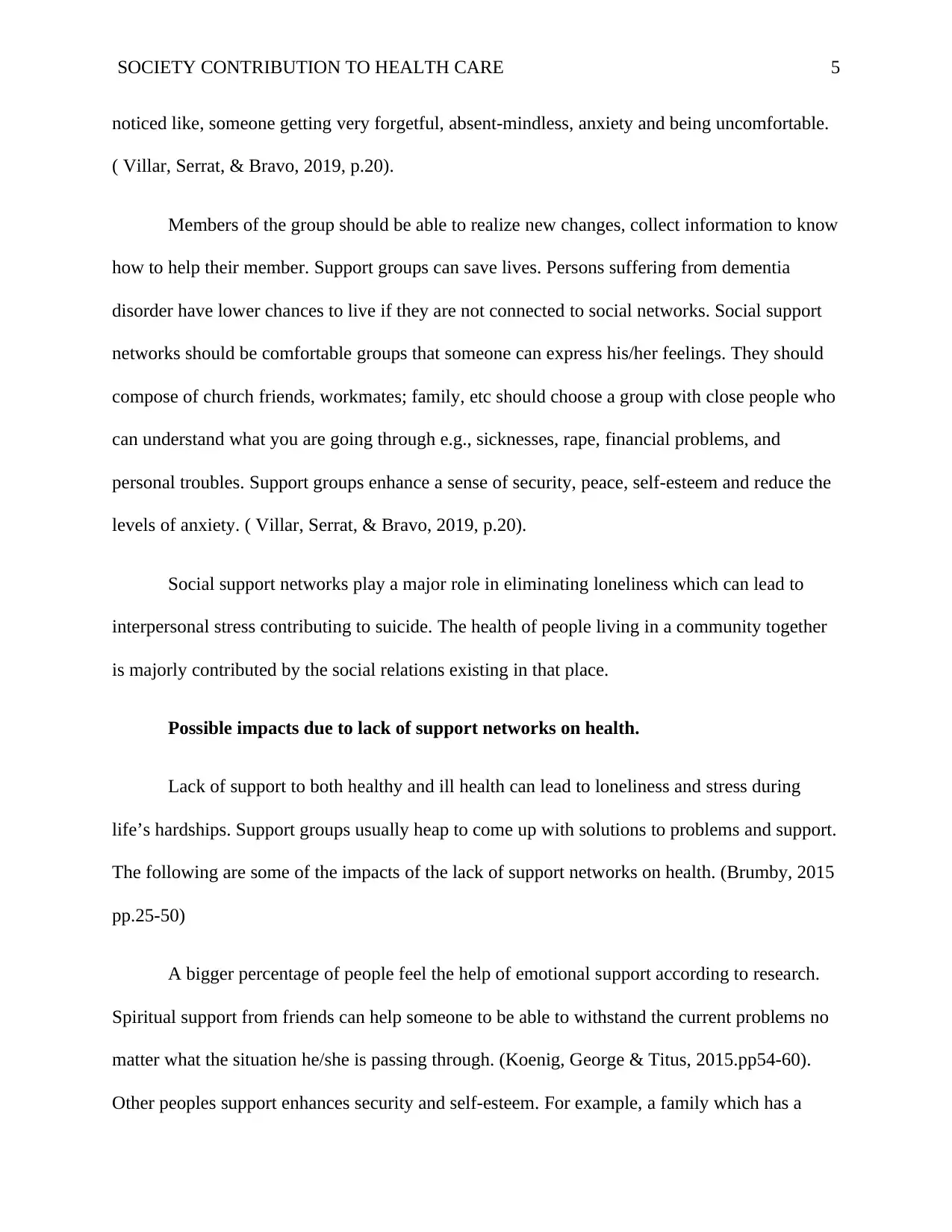
SOCIETY CONTRIBUTION TO HEALTH CARE 5
noticed like, someone getting very forgetful, absent-mindless, anxiety and being uncomfortable.
( Villar, Serrat, & Bravo, 2019, p.20).
Members of the group should be able to realize new changes, collect information to know
how to help their member. Support groups can save lives. Persons suffering from dementia
disorder have lower chances to live if they are not connected to social networks. Social support
networks should be comfortable groups that someone can express his/her feelings. They should
compose of church friends, workmates; family, etc should choose a group with close people who
can understand what you are going through e.g., sicknesses, rape, financial problems, and
personal troubles. Support groups enhance a sense of security, peace, self-esteem and reduce the
levels of anxiety. ( Villar, Serrat, & Bravo, 2019, p.20).
Social support networks play a major role in eliminating loneliness which can lead to
interpersonal stress contributing to suicide. The health of people living in a community together
is majorly contributed by the social relations existing in that place.
Possible impacts due to lack of support networks on health.
Lack of support to both healthy and ill health can lead to loneliness and stress during
life’s hardships. Support groups usually heap to come up with solutions to problems and support.
The following are some of the impacts of the lack of support networks on health. (Brumby, 2015
pp.25-50)
A bigger percentage of people feel the help of emotional support according to research.
Spiritual support from friends can help someone to be able to withstand the current problems no
matter what the situation he/she is passing through. (Koenig, George & Titus, 2015.pp54-60).
Other peoples support enhances security and self-esteem. For example, a family which has a
noticed like, someone getting very forgetful, absent-mindless, anxiety and being uncomfortable.
( Villar, Serrat, & Bravo, 2019, p.20).
Members of the group should be able to realize new changes, collect information to know
how to help their member. Support groups can save lives. Persons suffering from dementia
disorder have lower chances to live if they are not connected to social networks. Social support
networks should be comfortable groups that someone can express his/her feelings. They should
compose of church friends, workmates; family, etc should choose a group with close people who
can understand what you are going through e.g., sicknesses, rape, financial problems, and
personal troubles. Support groups enhance a sense of security, peace, self-esteem and reduce the
levels of anxiety. ( Villar, Serrat, & Bravo, 2019, p.20).
Social support networks play a major role in eliminating loneliness which can lead to
interpersonal stress contributing to suicide. The health of people living in a community together
is majorly contributed by the social relations existing in that place.
Possible impacts due to lack of support networks on health.
Lack of support to both healthy and ill health can lead to loneliness and stress during
life’s hardships. Support groups usually heap to come up with solutions to problems and support.
The following are some of the impacts of the lack of support networks on health. (Brumby, 2015
pp.25-50)
A bigger percentage of people feel the help of emotional support according to research.
Spiritual support from friends can help someone to be able to withstand the current problems no
matter what the situation he/she is passing through. (Koenig, George & Titus, 2015.pp54-60).
Other peoples support enhances security and self-esteem. For example, a family which has a
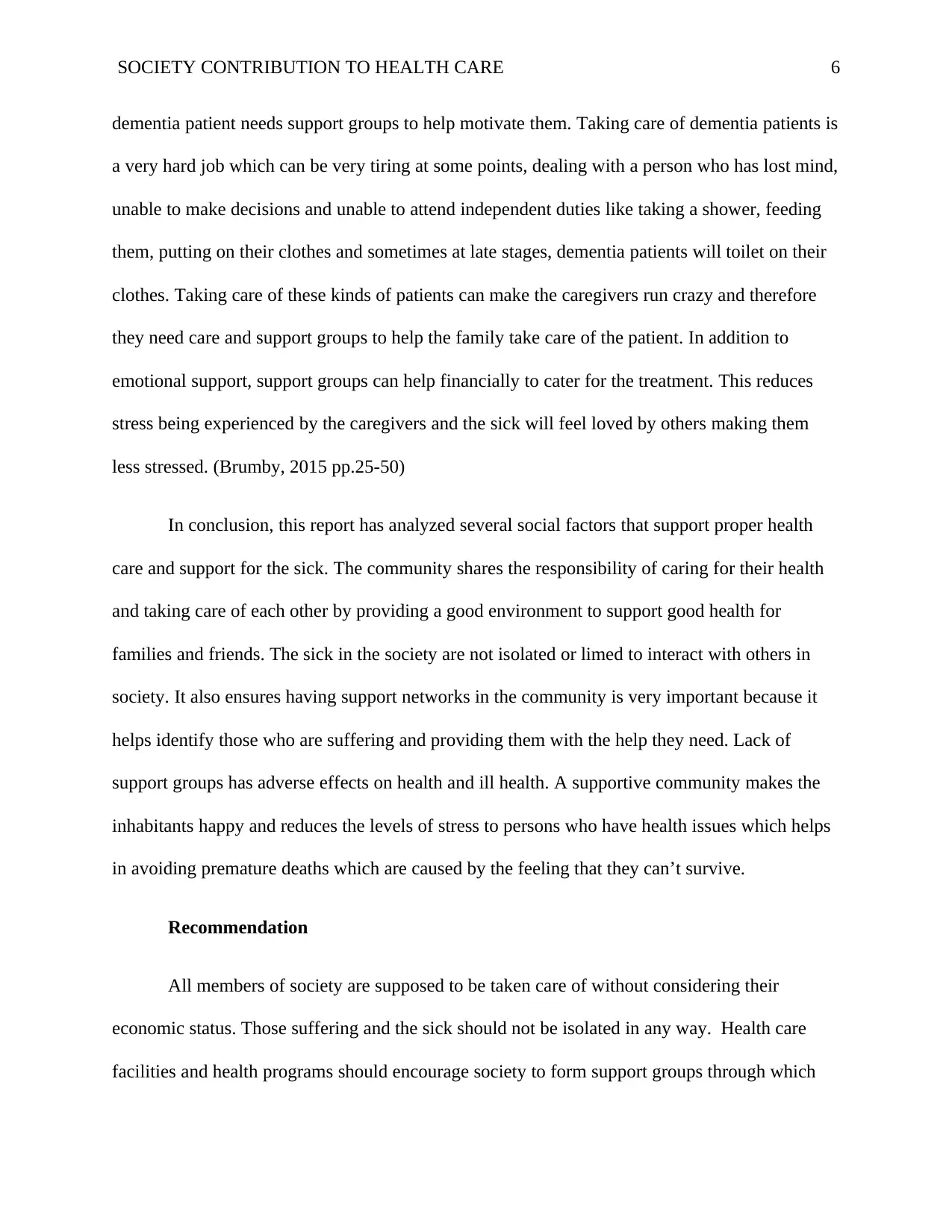
SOCIETY CONTRIBUTION TO HEALTH CARE 6
dementia patient needs support groups to help motivate them. Taking care of dementia patients is
a very hard job which can be very tiring at some points, dealing with a person who has lost mind,
unable to make decisions and unable to attend independent duties like taking a shower, feeding
them, putting on their clothes and sometimes at late stages, dementia patients will toilet on their
clothes. Taking care of these kinds of patients can make the caregivers run crazy and therefore
they need care and support groups to help the family take care of the patient. In addition to
emotional support, support groups can help financially to cater for the treatment. This reduces
stress being experienced by the caregivers and the sick will feel loved by others making them
less stressed. (Brumby, 2015 pp.25-50)
In conclusion, this report has analyzed several social factors that support proper health
care and support for the sick. The community shares the responsibility of caring for their health
and taking care of each other by providing a good environment to support good health for
families and friends. The sick in the society are not isolated or limed to interact with others in
society. It also ensures having support networks in the community is very important because it
helps identify those who are suffering and providing them with the help they need. Lack of
support groups has adverse effects on health and ill health. A supportive community makes the
inhabitants happy and reduces the levels of stress to persons who have health issues which helps
in avoiding premature deaths which are caused by the feeling that they can’t survive.
Recommendation
All members of society are supposed to be taken care of without considering their
economic status. Those suffering and the sick should not be isolated in any way. Health care
facilities and health programs should encourage society to form support groups through which
dementia patient needs support groups to help motivate them. Taking care of dementia patients is
a very hard job which can be very tiring at some points, dealing with a person who has lost mind,
unable to make decisions and unable to attend independent duties like taking a shower, feeding
them, putting on their clothes and sometimes at late stages, dementia patients will toilet on their
clothes. Taking care of these kinds of patients can make the caregivers run crazy and therefore
they need care and support groups to help the family take care of the patient. In addition to
emotional support, support groups can help financially to cater for the treatment. This reduces
stress being experienced by the caregivers and the sick will feel loved by others making them
less stressed. (Brumby, 2015 pp.25-50)
In conclusion, this report has analyzed several social factors that support proper health
care and support for the sick. The community shares the responsibility of caring for their health
and taking care of each other by providing a good environment to support good health for
families and friends. The sick in the society are not isolated or limed to interact with others in
society. It also ensures having support networks in the community is very important because it
helps identify those who are suffering and providing them with the help they need. Lack of
support groups has adverse effects on health and ill health. A supportive community makes the
inhabitants happy and reduces the levels of stress to persons who have health issues which helps
in avoiding premature deaths which are caused by the feeling that they can’t survive.
Recommendation
All members of society are supposed to be taken care of without considering their
economic status. Those suffering and the sick should not be isolated in any way. Health care
facilities and health programs should encourage society to form support groups through which
⊘ This is a preview!⊘
Do you want full access?
Subscribe today to unlock all pages.

Trusted by 1+ million students worldwide
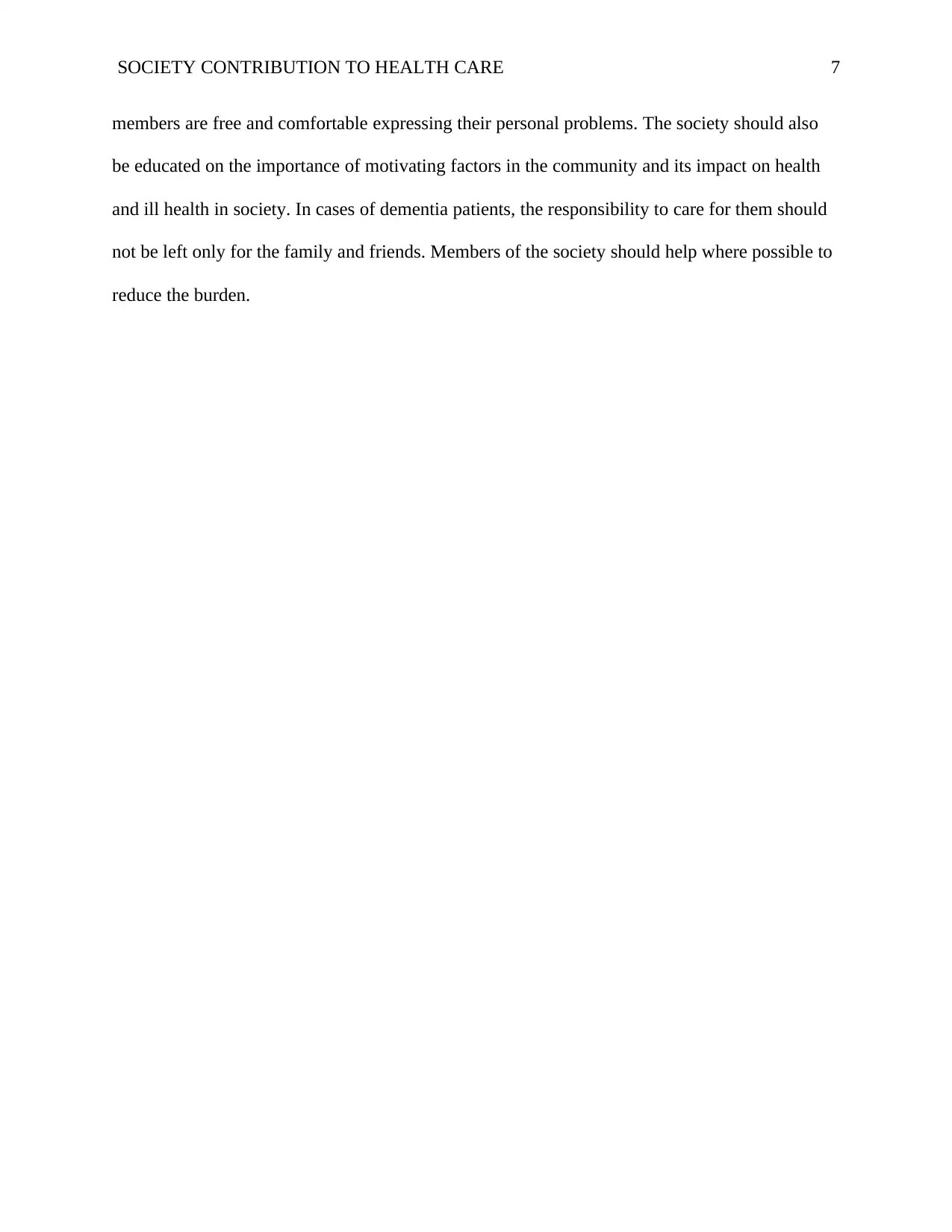
SOCIETY CONTRIBUTION TO HEALTH CARE 7
members are free and comfortable expressing their personal problems. The society should also
be educated on the importance of motivating factors in the community and its impact on health
and ill health in society. In cases of dementia patients, the responsibility to care for them should
not be left only for the family and friends. Members of the society should help where possible to
reduce the burden.
members are free and comfortable expressing their personal problems. The society should also
be educated on the importance of motivating factors in the community and its impact on health
and ill health in society. In cases of dementia patients, the responsibility to care for them should
not be left only for the family and friends. Members of the society should help where possible to
reduce the burden.
Paraphrase This Document
Need a fresh take? Get an instant paraphrase of this document with our AI Paraphraser
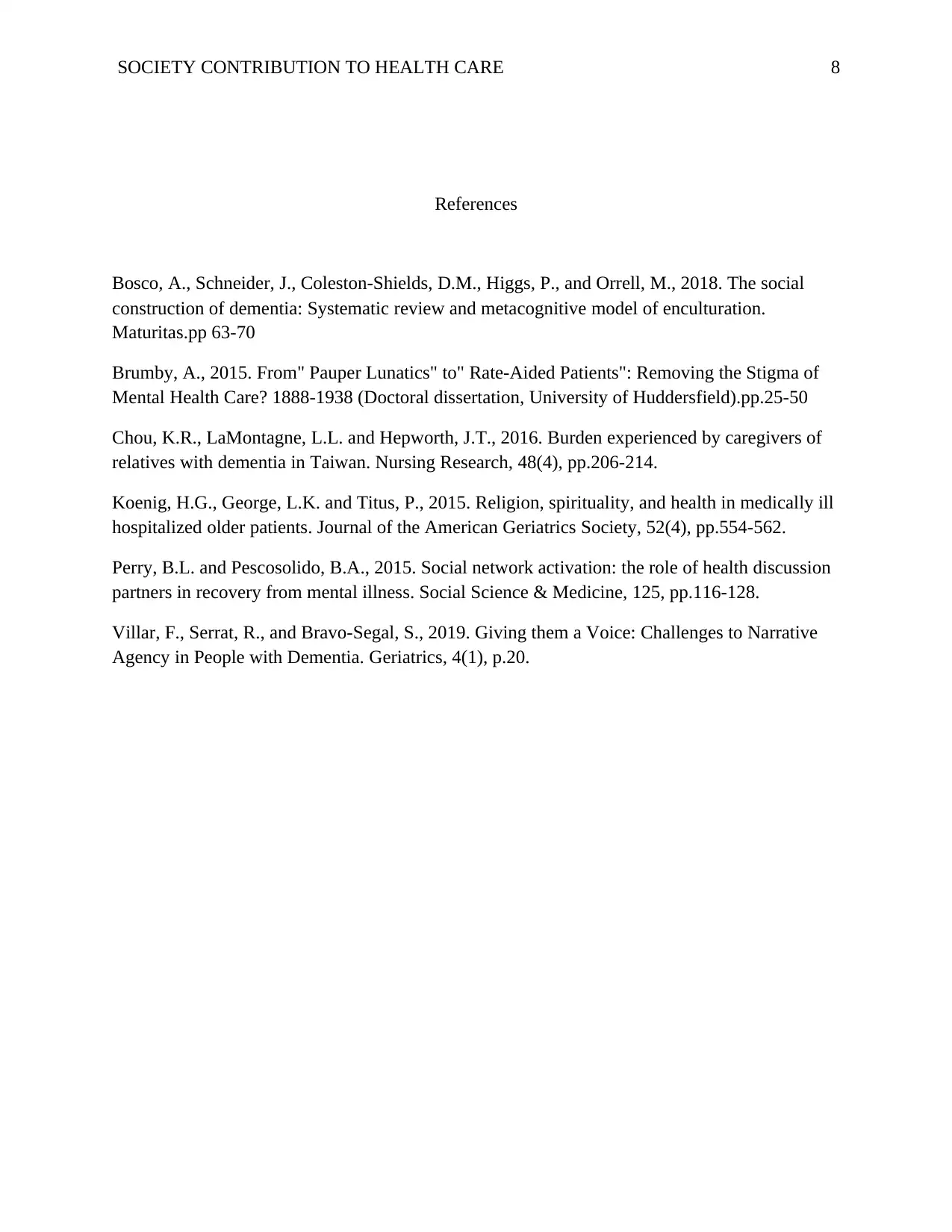
SOCIETY CONTRIBUTION TO HEALTH CARE 8
References
Bosco, A., Schneider, J., Coleston-Shields, D.M., Higgs, P., and Orrell, M., 2018. The social
construction of dementia: Systematic review and metacognitive model of enculturation.
Maturitas.pp 63-70
Brumby, A., 2015. From" Pauper Lunatics" to" Rate-Aided Patients": Removing the Stigma of
Mental Health Care? 1888-1938 (Doctoral dissertation, University of Huddersfield).pp.25-50
Chou, K.R., LaMontagne, L.L. and Hepworth, J.T., 2016. Burden experienced by caregivers of
relatives with dementia in Taiwan. Nursing Research, 48(4), pp.206-214.
Koenig, H.G., George, L.K. and Titus, P., 2015. Religion, spirituality, and health in medically ill
hospitalized older patients. Journal of the American Geriatrics Society, 52(4), pp.554-562.
Perry, B.L. and Pescosolido, B.A., 2015. Social network activation: the role of health discussion
partners in recovery from mental illness. Social Science & Medicine, 125, pp.116-128.
Villar, F., Serrat, R., and Bravo-Segal, S., 2019. Giving them a Voice: Challenges to Narrative
Agency in People with Dementia. Geriatrics, 4(1), p.20.
References
Bosco, A., Schneider, J., Coleston-Shields, D.M., Higgs, P., and Orrell, M., 2018. The social
construction of dementia: Systematic review and metacognitive model of enculturation.
Maturitas.pp 63-70
Brumby, A., 2015. From" Pauper Lunatics" to" Rate-Aided Patients": Removing the Stigma of
Mental Health Care? 1888-1938 (Doctoral dissertation, University of Huddersfield).pp.25-50
Chou, K.R., LaMontagne, L.L. and Hepworth, J.T., 2016. Burden experienced by caregivers of
relatives with dementia in Taiwan. Nursing Research, 48(4), pp.206-214.
Koenig, H.G., George, L.K. and Titus, P., 2015. Religion, spirituality, and health in medically ill
hospitalized older patients. Journal of the American Geriatrics Society, 52(4), pp.554-562.
Perry, B.L. and Pescosolido, B.A., 2015. Social network activation: the role of health discussion
partners in recovery from mental illness. Social Science & Medicine, 125, pp.116-128.
Villar, F., Serrat, R., and Bravo-Segal, S., 2019. Giving them a Voice: Challenges to Narrative
Agency in People with Dementia. Geriatrics, 4(1), p.20.
1 out of 8
Related Documents
Your All-in-One AI-Powered Toolkit for Academic Success.
+13062052269
info@desklib.com
Available 24*7 on WhatsApp / Email
![[object Object]](/_next/static/media/star-bottom.7253800d.svg)
Unlock your academic potential
Copyright © 2020–2026 A2Z Services. All Rights Reserved. Developed and managed by ZUCOL.




